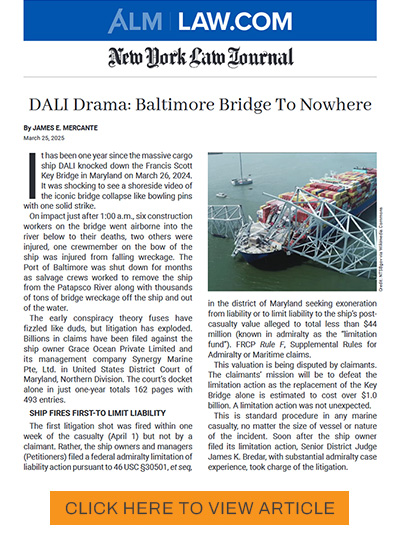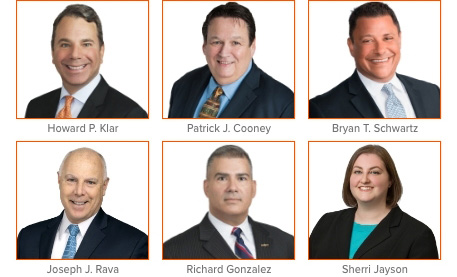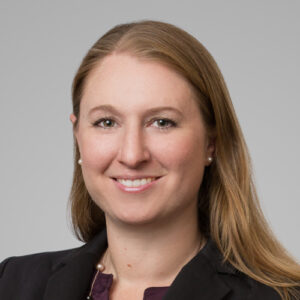GVK is proud to announce the promotion of Rachel S. Trauner and Scott P. Eisenberg to Partner. This well-earned recognition reflects their exceptional work, commitment to our clients, and contributions to the firm’s success.
Rachel is a key member of our Labor Law practice, known not only for her litigation skills in state and federal courts, but also for her leadership within the firm. She regularly handles complex claims, securing dismissals in cases involving risk transfer and coverage disputes. Beyond her legal work, Rachel is a mentor to our young attorneys, manages the GVK newsletter, and is currently launching our firm’s first podcast.
Scott focuses his practice on defending commercial and residential properties against premises liability and property damage claims. He works closely with clients, insurance carriers, investigators, and experts to resolve cases efficiently and effectively. Scott’s results-driven mindset has earned him a strong reputation both inside and outside the firm. He is a tireless advocate for our clients, a wonderful team player and always willing to go above and beyond for the firm.
We’re thrilled to celebrate this career milestone for Rachel and Scott and look forward to their continued success at GVK.
DALI Drama: Baltimore Bridge To Nowhere
 It has been one year since the massive cargo ship DALI knocked down the Francis Scott Key Bridge in Maryland on March 26, 2024. It was shocking to see a shoreside video of the iconic bridge collapse like bowling pins with one solid strike.
It has been one year since the massive cargo ship DALI knocked down the Francis Scott Key Bridge in Maryland on March 26, 2024. It was shocking to see a shoreside video of the iconic bridge collapse like bowling pins with one solid strike.
On impact just after 1:00 a.m., six construction workers on the bridge went airborne into the river below to their deaths, two others were injured, one crewmember on the bow of the ship was injured from falling wreckage. The Port of Baltimore was shut down for months as salvage crews worked to remove the ship from the Patapsco River along with thousands of tons of bridge wreckage off the ship and out of the water.
The early conspiracy theory fuses have fizzled like duds, but litigation has exploded. Billions in claims have been filed against the ship owner Grace Ocean Private Limited and its management company Synergy Marine Pte, Ltd. in United States District Court of Maryland, Northern Division. The court’s docket alone in just one-year totals 162 pages with 493 entries.
SHIP FIRES FIRST-TO LIMIT LIABILITY
The first litigation shot was fired within one week of the casualty (April 1) but not by a claimant. Rather, the ship owners and managers (Petitioners) filed a federal admiralty limitation of liability action pursuant to 46 USC §30501, et seq, in the district of Maryland seeking exoneration from liability or to limit liability to the ship’s post casualty value alleged to total less than $44 million (known in admiralty as the “limitation fund”). FRCP Rule F, Supplemental Rules for Admiralty or Maritime claims.
This valuation is being disputed by claimants. The claimants’ mission will be to defeat the limitation action as the replacement of the Key Bridge alone is estimated to cost over $1.0 billion. A limitation action was not unexpected.
This is standard procedure in any marine casualty, no matter the size of vessel or nature of the incident. Soon after the ship owner filed its limitation action, Senior District Judge James K. Bredar, with substantial admiralty case experience, took charge of the litigation.
A limitation action serves to streamline the litigation because settlements will follow if the court determines Petitioners are entitled to limit their liability to the less than alleged $44 million ship value. Petitioners in admiralty often settle claims outside of the limitation action.
This does not impact the limitation fund which remains available to other claimants still in the litigation. Indeed, the vessel owner already settled the federal government’s claim for wreck removal and response costs for $100 million in October 2024. The settlement also extinguished the government’s claim for punitive damages.
The filing of the limitation action also prompted a California congressman to introduce an Amendment to the Limitation Act on Aug. 13, 2024 (H.R. 9348) to make the limitation ‘ten times’ the value of the ship and to apply retroactive to the casualty date. That proposal, named the Justice for Victims of Foreign Vessel Accidents Act, has picked up little to no steam in congress.
CLAIMS AND DEFENSES-FULL SPEED AHEAD
Nearly every claim imaginable in maritime law is evident. The claims include rebuilding the bridge, hull and machinery loss to the ship, wreck removal, salvage, cargo loss and damage, shipping container damage claims, pollution cleanup, vessel charter party disputes in the UK, ship owner’s admiralty claim in New York for a “general average” contribution from cargo interests, personal injury, wrongful death, and an FBI investigation that may result in criminal charges under the Seaman’s Manslaughter Statute.
The closure of the river and destruction of the bridge implicates a substantial business interruption claim by the Port of Baltimore and state of Maryland. Since 1927, business interruption losses are not recoverable in admiralty without proof of physical damage. Robins Dry Dock & Repair Co. v. Flint, 275 U.S. 303 (1927). Thus, while the bridge owner, state of Maryland, will have a viable business interruption claim, the hundreds of businesses that filed a class action lawsuit may not.
These claims face an uphill battle under the Robins Dry Dock rationale, but the class action claimants are attempting an end around the Robins damages restriction by relying upon certain exceptions to Robins that courts have recognized such as public nuisance, criminal, intentional or reckless acts.
However, under the court’s multiple case management orders, none of the damages claims will see the light of day (or any dispositive motions to dismiss same) before the vessel owner’s petition for exoneration from or limitation of liability is determined in the first instance.
This makes good procedural sense in handling a complex admiralty litigation. Thus, the scope of discovery is for the most part being bifurcated to obtain a ruling first on exoneration or limitation, and if neither succeed, to move into the numerous claims for damages and dispositive motions. Judge Bredar’s rational is to resolve the limitation question first, and only then turn to the merits of the individual claims. Lewis v. Lewis & Clark Marine, Inc., 531 U.S. 438, 448 (2001); Case Management Order No. 3; Document 438; 11/07/24.
The judge noted that “even if certain claims were dismissed early in the life of this case, there would be no appreciable difference in the complexity of the Phase 1 trial, which would focus on the exact same issues regardless of which claimants participated”. Citing In re Oil Spill by the Oil Rig Deepwater Horizon, 808 F. Supp.2d 943, 964-65 (E.D.La. 2011). The limitation action in Phase 1 will focus first on the DALI’s seaworthiness and/or negligence which is claimants’ burden to prove.
If claimants prove fault of the ship or its crew, the burden then shifts to petitioners (as the ship owners ashore) to prove that they were without privity or knowledge of the condition of the ship or onboard negligence that was responsible for the collision.
Other damage issues to be decided after phase I will likely include the defense of ‘betterment’ to the bridge as well as any deduction for ‘depreciation’. Reduction in damages for ‘betterment’ or ‘upgrades’ to the newly constructed bridge is typically within the judge’s discretion. Such evidence of upgrades could include a better reinforced bridge and pilings, adding more lanes and tolls, greater vehicle capacity, and higher elevation to accommodate larger ships.
Another issue on the radar will be the state of Maryland allegedly having ignored warnings as early as 1983 in a bridge study that the Key Bridge was in need of strengthening and protection in light of the larger and heavier ships calling on the port.
CAUSE AND EFFECT
The NTSB concluded that a primary electrical breaker that feeds most of the DALI’s equipment and lighting tripped. This caused a complete blackout (loss of electrical power) and shut down the main propulsion diesel engine.
The NTSB also determined during its investigation that the ship had two power outages (complete blackouts) on March 25th, just 10 hours prior to its scheduled departure from Baltimore. Power was restored and the crew switched to a different breaker panel and transformer for departure on March 26th. See NTSB Reports on DALI crash, May 14, 2024; June 24, 2024.
No part of an NTSB’s final accident report “may be submitted into evidence or used in a civil action for damages resulting from a matter mentioned in the report”. 49 USC §1154(b). The NTSB’s investigatory procedures are not designed to facilitate litigation. See, James Mercante and Kristin Poling, Soup to Nuts: Navigating Marine Casualty Investigations, 43 Tulane Maritime Law Journal, p. 359. Similarly, coast guard reports are not admissible in civil action.
Interestingly, on March 18, 2025, the NTSB issued a report concluding that had the Maryland Transportation Authority (MDTA) “conducted a vulnerability assessment of the bridge based on recent vessel traffic, as recommended by a 1991 and 2009 American Association of State Highway and Transportation Officials (AASHTO) Guide Specifications, the MDTA would have been aware that this bridge was well above the threshold of risk for catastrophic collapse from a vessel collision when the DALI collision occurred”. It remains to be seen how this finding will impact litigation.
CREW DETAINED
The key deck and engine crew members of the DALI (mostly from India or Singapore) have been detained by the U.S. Department of Justice pending not only the FBI and DOJ criminal investigation but also until testimony in the multiple civil suits could be taken before the crew departs the jurisdiction.
The crew depositions are underway with ten or so crew depositions completed as of this writing, including the ship captain, deck officers, engineers and the independent Maryland State Pilot. For the Maryland State Pilot, this was a routine bridge transit; one likely that he had performed a thousand times with ships of all sizes.
The pilot’s heroic actions including immediately radioing a mayday to alert local authorities, other marine traffic on VHF radio, and the bridge tender when the allision became inevitable, provided time for the bridge to be evacuated, thus saving lives.
A bench trial is set for June 1, 2026 to resolve he Phase 1 issues. By comparison, the 1989 EXXON VALDEZ grounding and oil spill in Prince William Sound, Alaska, took 20 years to reach finality. With Judge Bredar at the helm, this voyage should reach its destination much faster.
JAMES E. MERCANTE is a partner at Gallo Vitucci Klar LLP (in merger with his former firm Rubin, Fiorella, Friedman & Mercante LLP) and President of the Board of Commissioners of Pilots of the State of New York. RICHARD GONZALEZ, of counsel, assisted in the preparation of this article.
Plaintiff, a tenant in Defendant’s Bronx County apartment building, claimed to have tripped while descending the building’s interior stairs on her way to physical therapy for injuries she sustained in a prior workplace accident nine years earlier.
Sara David litigated the case from its inception in 2019 and argued the appeal in November2024. Through detailed deposition questioning,reference to the photographs Plaintiff claimed to have taken, and the expert opinion of a Biomechanical Engineer, Sara proved both that the defect was trivial and therefore not actionable, and that Plaintiff’s description of the accident was physically impossible.
On December 31, 2024, the First Department unanimously held that the Defendant building owner was entitled to summary judgment. The Court held that the defect Plaintiff identified as the sole cause of her fall was trivial and therefore not actionable. The Court also agreed with Defendant’s expert that the accident could not have happened as Plaintiff described because her left foot could not have contacted the far-right side of the step where Plaintiff claimed the defect was located. Although Plaintiff’s expert identified a litany of allegedly dangerous conditions in the stairway when he inspected it five years after the accident, the First Department properly held that they were irrelevant as Plaintiff did not cite them as a proximate cause of her fall.
Plaintiff claimed to have sustained injuries to her cervical and lumbar spine, knee and shoulder and to have undergone cervical and lumbar fusion surgeries, as well as knee and shoulder surgeries after the subject accident. Plaintiff’s counsel demanded $10M.
Sara previously won summary judgment on behalf of the property management company.
Hats off, as well, to GVK’s appellate team, Briggs Johnson and Edward Tobin, who provided appellate assistance.
Proponents of the Assembly and Senate backed Grieving Family Act bill had previously presented the bill to Governor Hochul for signature on two prior occasions, but it was vetoed and sent back to Legislators each time for revisions. While small changes were made, the Governor refused to sign the bill into law citing concerns that “…these changes would likely have resulted in high costs to patients and consumers, as well as other unintended consequences…”.
The revised bill sought to expand the 180-year-old Wrongful Death Act by allowing family members to seek emotional damages, such as grief and mental and emotional anguish, while also expanding the pool of those that can seek damages and extending the statute of limitations for wrongful death to three years.
Opponents of the revised wrongful death bill, including the health care industry, argued that it would result in “… an explosion of costly litigation, at the expense of those they serve…”. Moreover, the revised bill would drive up the cost of higher medical malpractice insurance and premium rates resulting in a direct impact on patient care, and difficulty attracting new doctors to New York State, which is already experiencing a shortage of physicians. Governor Hochul further added that “[f]or the third year in a row, the legislature has passed a bill that continues to pose significant ridges to consumers, without many of the changes I expressed… [during the] previous rounds of negotiations…”.
While advocates for a revised and expanded Wrongful Death Act will certainly go back to the drawing board, Governor Hochul has indicated that the vetoed legislation, as currently written, is “well- intentioned” but would likely lead to higher insurance premiums and have a negative impact on the health care system. Nevertheless, the Governor appears committed to working with the legislature to find a balance.
We will continue keeping you updated on all developments. If you have any questions, please feel free to contact Bryan Schwartz or Jeremy Weg.
On Friday, December 13th, Martin Rowe secured a defense verdict in Supreme Court, Bronx County, delivering a significant win for our client, a supermarket operator. The plaintiff, a customer, alleged that she sustained injuries after a fall in the store, claiming she tripped over a box placed in the aisle by a vendor restocking shelves.
The plaintiff alleged she suffered a traumatic brain injury, a torn rotator cuff requiring surgery, and an aggravation of preexisting cervical and lumbar injuries. Through cross-examination of the plaintiff and the testimony of the former store manager who prepared the accident report, Martin argued that the plaintiff’s own inattentiveness caused the incident. He further demonstrated that the defendant neither created the hazardous condition nor had prior knowledge of it.
To strengthen the defense, testimony was provided by an orthopedic surgeon and a radiologist, both of whom confirmed that the plaintiff’s injuries were preexisting, degenerative, and unrelated to the alleged fall. The pretrial demand was $2 million, and at trial, the jury was asked for $3.5 million. Despite this, Martin’s arguments prevailed, resulting in a favorable outcome for the defense.
Gallo Vitucci Klar LLP is proud to announce that 9 of our attorneys have been named to the 2024 Super Lawyers and Rising Stars list! These prestigious honors highlight legal professionals who have demonstrated outstanding dedication and skill in their respective fields. With only 5% of lawyers in New York selected as Super Lawyers and just 2.5% earning the Rising Stars designation, we are honored that several of our attorneys continue to be recognized year after year for their exceptional work.
2024 Super Lawyers
Our GVK 2024 New York Metro Super Lawyers list:
- Senior Partner, Howard P. Klar has been named a Super Lawyer for his thirteenth consecutive year in civil litigation defense.
- Partner, Patrick J. Cooney selected for his fourth consecutive year in personal injury defense.
- Partner, Bryan T. Schwartz selected for his fourth consecutive year in personal injury defense.
- Partner, Joseph J. Rava selected for his fourth consecutive year in personal injury defense.
- Of Counsel, Richard Gonzalez selected for his second consecutive year in transportation as well as maritime defense.
- Partner, Sherri Jayson selected for civil litigation defense.

2024 Rising Stars
Our GVK 2024 New York Metro Rising Stars list:
- Partner, Brandon Weinstein selected for his third consecutive year in civil litigation defense.
- Associate, Melissa D. Patzelt-Russo selected for her second consecutive year in personal injury defense.
- Associate, David Placke selected for personal injury defense.

GVK has recently filed several motions across the New York State Court System regarding a certain plaintiff’s law firm that has admitted that it helped bring 200-300 fraudulent cases into our Courts.
That firm has told the courts and the defense bar that it can walk away from these potentially fraudulent cases (they have not identified which cases are fraudulent on the record) without saying a word regarding whether portions of those cases or the entirety of those cases are fraudulent. Up until now, the Courts have either allowed that law firm to walk away without explanation, or allowed the firm to file a consent to change attorney without explanation – and all without an attorney charging lien (which would have entitled to them to proceeds on any settlement). In some instances, the Courts have allowed the defendants to amend their answers to assert fraud defenses, allowing the possibility of the defendants to prove fraud if discovery turns up such unlikely evidence.
We disagree. We believe that the idea that the courts might allow additional discovery to take place down the road to identify potential fraud is inadequate, and will likely never be successful. Instead, we have argued – an idea supported by a highly regarded ethics attorney – that: the burden is on the plaintiff and the law firm and the referral source to immediately disclose any information, evidence, or communications regarding any and all fraud of any kind to the Court and the defendants immediately; and that the Court have their own independent responsibility and obligation to investigate the fraud. We believe that it is not the defendants’ burden to try and find evidence of fraud during the discovery process, because the defendants did not bring the fraud into the Courts in the first place.
More specifically, based on a major collaboration here at our firm, and our retention of a well-credentialed and highly respected ethics expert, our research and collaboration found that that law firm must: (1) correct any prior false statements made to the Court (pleadings, affirmations, testimony, etc.), even if inadvertently made; (2) that any information regarding prior, ongoing, or future fraud must be disclosed immediately; (3) that a “noisy withdrawal” (implying that the action is tainted by fraud without saying it) is no longer an option in New York anymore; (4) that the crime-fraud exception to the attorney-client privilege does not protect fraudulent communications and actions; and (5) that no attorney-client privilege attaches if the fraud involves a referral source that helped bring a fraudulent action into the Court. We have also found that the Court also has an independent obligation to investigate the fraud and to rid such fraud from the Courts.
This is an alternative approach, and another option for all defense firms out there who are working together to eliminate the fraud from the Courts. We believe that this is a more effective path to actually uncover the fraud, and to not allow potential fraudulent suits to continue in the courts.
If you have any questions regarding our approach, please reach out to C. Briggs Johnson and Howard Klar.
James Mercante, the head of GVK’s Admiralty practice, presented on September 16, 2024, at the 150th Anniversary of the International Union of Marine Insurance (IUMI) conference in Berlin, Germany. This significant event marks a milestone in the IUMI’s history, tracing back to its inaugural General Assembly in January 1874. Originally convened by 31 representatives from 39 marine insurance societies, the assembly aimed to foster cooperation and establish uniform principles for handling marine insurance matters. The IUMI conference has since evolved into a pivotal platform for discussing technical challenges, legislative improvements, and fostering a collaborative spirit among industry professionals. Mercante’s presentation will delve into the maritime law aspects of the DALI/KEY Bridge ship crash.
See TradeWinds article on No-nonsense judge seeks early end to Baltimore bridge liability battle here. 10/4/24
See TradeWinds article on premiums rising across the board here. 9/20/24
See TradeWinds podcast here. 9/20/24
See Lloyd’s List article about Mercante’s presentation at the IUMI conference here. 9/17/24
See TradeWinds article on loose wire theory that boosts shipowner in US liability battle over bridge collapse here. 9/16/2024
Written by C. Briggs Johnson
In Liciaga v. New York City Tr. Auth., 2024 NY Slip Op 04257 (2d Dep’t Aug. 21, 2024), the Appellate Division, Second Department recently issued a groundbreaking and long overdue decision allowing defendants in personal injury actions to attack a plaintiff’s award of future medical expenses under the Patient Protection and Affordable Care Act (“ACA”). The essential take away from the holding is that a defendant can seek a collateral source hearing under CPLR 4545, even if a plaintiff does not have insurance coverage if the plaintiff qualifies for medical insurance coverage under the Affordable Care Act. The plaintiff cannot simply decide not to obtain coverage under the ACA, because of plaintiff’s duty to mitigate his or her damages.
As the Court noted, this applies to most Americans. “Pursuant to the ACA, most Americans must obtain ‘minimum essential [health insurance] coverage.” And, “plaintiffs are also required to mitigate their damages and thus ‘make reasonable exertions to render the[ir] injur[ies] as light as possible.” Thus, the Court continued, “[t]o the extent that a plaintiff can mitigate his or her damages by procuring insurance coverage that would offset some portion of his or her future medical expenses, he or she cannot simply decline to do so without a plausible explanation and avoid potential consequences.”
For example, if a plaintiff is awarded $1,000,000 in future medical expenses, plaintiff is uninsured, and a defendant can prove that the plaintiff is qualified for insurance coverage under the ACA, and that that insurance coverage would have paid $200,000 dollars towards plaintiff’s future medical damages, a defendant is entitled to a $200,000 reduction in those future medical damages under CPLR 4545. We anticipate that this decision will have broad implications for the entire defense bar, and it will add another crucial tool in mitigating a plaintiff’s damages.
Please feel free to reach out either Howard Klar or C. Briggs Johnson regarding any questions you may have regarding this decision and how it impacts our clients, and on how we may be of assistance in helping to brief any post-trial motions on this issue.
The plaintiff claimed that on May 17, 2022, he was injured when he attempted to hold up his Harley Davidson motorcycle as it began falling over after he parked it on the unpaved driveway of the subject premises that he and his wife were leasing from our landlord client. Plaintiff argued that our client failed to repair or replace the unpaved driveway which he claimed was dangerous, defective, broken, unsafe, rocky and hard to navigate, and that the existence of a large rock and the unpaved condition of the driveway caused his motorcycle to become stuck and fall over. Our motion for summary judgment focused on the lack of any dangerous or defective conditions which proximately caused plaintiff’s accident, the lack of any notice to our client, and the absence of any prior reported accidents. In addition, we argued that plaintiff’s act of grabbing and attempting to hold the motorcycle up to stop it from falling over was the sole proximate cause of his injuries. In support, we presented to the Court testimony that neither plaintiff nor his wife made prior complaints about the driveway’s condition, and the specific rock claimed to have caused the accident, and that the alleged condition of the driveway was open and obvious and known to plaintiffs, who had resided at the premises for a year prior to the accident. In addition, we submitted affidavits from our clients attesting that while the driveway was not in aesthetically good condition, it was safe and functional and did not need to be replaced.
The Court agreed with our argument that the presence of rocks on the unpaved driveway, and the alleged tendency of the surface to become wet and “mushy” when it rained did not constitute unreasonably dangerous conditions, and was open and obvious and not inherently dangerous, and dismissed the complaint. Additionally, the Court ruled that the evidence in the case failed to support plaintiffs’ allegations that the alleged negligent maintenance of the subject driveway caused the plaintiff’s injuries.
The complaint was dismissed in its entirety. A demand of $2.4 million dollars had been made prior to the service of the motion.



